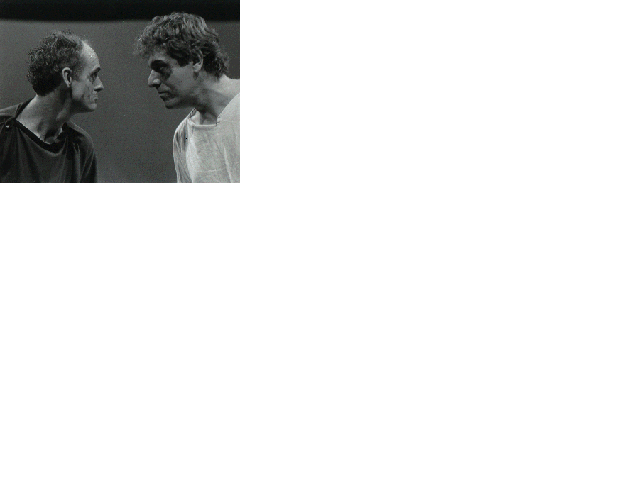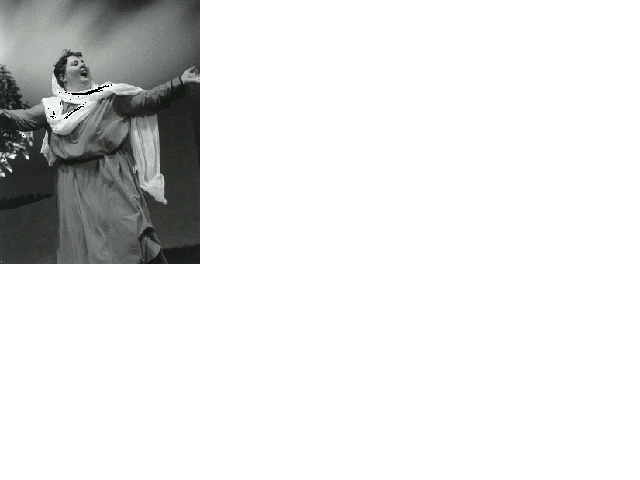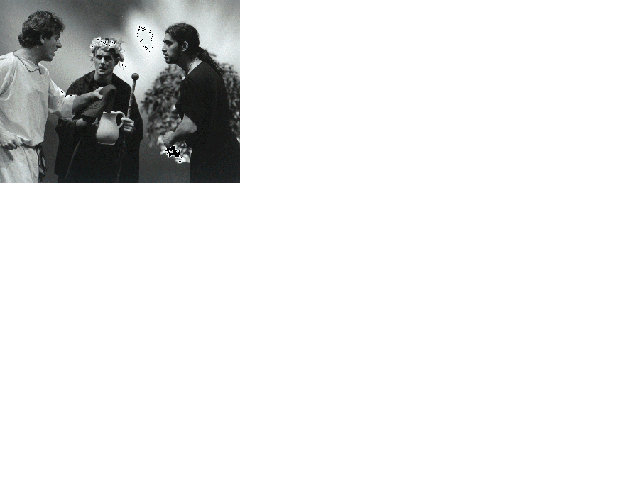A production report by the director and translator of Plautus' Casina:
Judith Maitland
Department of Classics and Ancient History
University of Western Australia
E-mail: jmaitla@uniwa.uwa.edu.au

Lysidamus and Olympio have a standoff
The department of Classics and Ancient History, the University of Western Australia, has been presenting ancient theater annually since 1989. The idea originated with Professor John Jory of this department and Dr Robin Bond of the University of Canterbury, Christchuch, NZ; Dr Bond was arranging to spend his study leave in Perth and was interested in directing a play. We chose Plautus' Amphitryo, and I consented to be Dr Bond's assistant on condition that I play the part of Bromia. I also acted as production and stage manager, and we had a delightful cast of students who became the basis of our company. The production was a success, and as we saw no reason to discontinue the practice, I have produced a play each year ever since, and still enjoy Dr Bond's comments and advice by e-mail.
I decided to stick to comedy as it tends to be neglected in favour of 'serious' productions of tragedy, and is in any case less taxing for amateurs and novices. So far we have tended to present more of Aristophanes' work than of Plautus', and I have steered away from Terence, who seems to have been hard work even for the audiences of his own time.
This year two members of the company suggested Casina, as it was time for a Roman comedy and it is ideally suited to the comic talents of two members of our regular cast. I was also encouraged by the addition of an amateur musician to the company. Philip Korn had taken a small part in our production of Thesmophoriazusae and had expressed interest in setting choruses to music. We had tried this for the next production, Clouds, and found the collaboration productive. My experience with certain scenes in Amphitryo and The Rope had forced me to conclude that Plautus' cantica make for dialogue that is inconsequential, difficult to learn and cumbersome to perform. I was thus delighted by the prospect of seeing how they would run when set to music. I duly translated the piece, passing large sections to the impatient musician as I went along. The process was enjoyable; Philip was enthusiastic and showed a happy knack for devising musical lines to fit my idea of Plautus' robust lyrics. The decision turned out to be inspired. I was worried about overburdening the actors with music to learn, but in practice they found that the addition of music made the lines easier to remember and gave shape to the cantica. Thus scenes that I had expected to be problematic were transformed. The actors were so pleased with the results that they actually importuned the musician to turn more of their lines into songs.
Cleostrata sings:-
What I'd like to see,
what I'd like to see,
is that old man
come out here
with a broken face!
As director, I had to give considerable thought to presentation of the plot and to characterisation. The plot is unpleasant, but I was not inclined simply to accept this as a 'darker comedy' (as Tatum dubbed his translations of Casina, Bacchides, and Truculentus in 1983). Plautus threatens his audience with a great deal of nasty behaviour on the part of his characters, but mitigates the threat not only with a reassurance in the prologue that 'nobody's going to be raped on stage today' but with constant reminders that the play is set in Athens. This is cunning; what might be distressing in a respectable paterfamilias is merely scandalising in an elderly and goatish Athenian.


Olympio is sure the lots are rigged
To bring out the outrageousness of the scenario, we exaggerated the dramatic devices: a pre-recorded creak presaged the actors' 'oops! the door's opening!' with which a new entrance was announced, there was no attempt to conceal eavesdropping and asides, and characters in hiding or ambush merely scuttled about protected only by a small hand-held shrub. In performance, I asked for larger-than-life characterisation. This worked very well; the first extended song and dance routine between Cleostrata and Lysidamus effectively drew the battle lines and set the base level for absurdity:
LY. 'Give me just one glance, my sweetness!
CL. Sweetness! Sickly sweet, you mean!
For heaven's sake, what is that pong?LY. Oh shit! I've had it! What a fool! I've let her catch me out! Quick! I'd better wipe it off - wipe it on my cloak... Damn that tart in the perfume shop, she squirted me all over!
CL. Oho! you miserable, grey haired little squirt,
I have to tell you off like you deserve. You slug! an old fart like you, marching down the street, covered in Aramis and Tuscany?'
By the time the actors reached the ridiculous scene where Chalinus thinks Lysidamus is about to make love to Olympio, the audience wouldn't have been surprised either. Obviously, if this approach is to succeed, the dialogue must be appropriately outrageous, so I decided to be fearless in translation. The only time I actually improvised was in the fragmentary sections of the wedding night narrative; I am confident that I neither let Plautus down nor added anything that he would not have written himself:
OL. 'Never a word did she answer, but she covered up her - her ladies' bits with her nightie. So when I saw she was all covered up, I asked her to let me try the - um - the back way. I thought I'd turn her over, but I was trying to keep out of the way of her elbows. Never a word did she say, but I couldn't budge her. I got up to get a better grip on her, and tried to get my knee under her.
PA. Ooh, now he's really telling it well!
OL. I finally managed to get near enough for a kiss. And she's got bristles on her chin like thorns! She punctured my lip! I sat back on my knees with surprise, and she kicked me in the chest. I was hurled off the bed onto my head; and then she pounced on me... and broke my face!'
I elected to speak the prologue myself, adding a line or so to include myself in the process of adaptation. It seemed appropriate to announce our production as simply the latest in a tradition of reviving and adapting the plays of Plautus.
The result was an entertaining small musical, which was noted in the local arts magazine, Artswest, as a significant contribution to the growing number of modest, low budget productions which provided a pleasant contrast to more lavish and costly musicals and operas.
Judith Maitland
The Department of Classics and Ancient History
The University of Western Australia.
E-mail: jmaitla@uniwa.uwa.edu.au
(Dr Maitland is lecturer in Classics at the University of Western Australia. This year's production will be Lysistrata; Dr Maitland has also been invited to direct Medea for the Graduate Dramatic Society.)
Richard Beacham's report on his own production of Casina
Kenneth Hamma's report on the Getty productions of Casina
